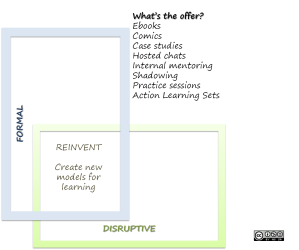
I’ve written previously about how we’re modelling our offer. The next stage of that offer falls into learning activities that are formal and disruptive.
The most common question I get asked about this blog is why it’s called Lost and Desperate. As I’ve posted before this is called lost and desperate as a reflection of the people I meet:
- Lost – what do they need to learn?
- Desperate – even if they know what to learn, they can’t find where to source it.
This part of our model differs from what L&D have traditionally offered. Firstly, it isn’t all about provision. The fact that we call this area as formal doesn’t mean it is all managed by L&D – remember in our model formal means managed by others.
Additionally, this part of the model is disruptive. This isn’t about the mandatory activity that you want to place in learning events – it’s about disruptive elements that are not measured to a specific standard.
So, let’s look at this part of our offer:
Ebooks
There’s a suggestion that books are out of date as soon as they’re printed. Donald Clark neatly pointed out earlier this year that it’s question of software. I think L&D’s role is to help people find the right software. When did you last give someone a link to an Ebook they can download for nil (or relatively low) cost? A quick google search for free eBooks hands up 148 million results. Why aren’t you using them? I know the first objection…
People like real books
So, when was the last time you gave one of your people a link to a library with a list of books they could use to aid their development? For example, with a learning resource for CV writing, we have a link to a library search page for ‘CV’. The books are listed, and their availability.
Comics
People love role plays; that’s why we fill training courses with them. What’s that? They don’t? This is where we’ve found comics to be useful. Using graphics available under a Creative Commons licence we have created 8-12 frame comic strips that tell a story about a particular situation. What makes these disruptive is that they have no answer sheet; they’re tools for our people to work with each other, alone, or SMEs in that area to learn how to approach the situation differently. What I like about them is how easy they are to make – 45 minutes and you can have a resource that can be used dozens of times.
Case Studies
I like case studies; they plant a foot in the real world yet allow people to work with a sense of safety. In my experience, the best case studies are simple 2-3 sentences that allow people to project their experience into their ‘solution’. What they’re not used enough for is ongoing reflection – a series of weekly case studies sent to a group of people, changing the case study based on the majority response are very powerful.
Hosted Chats
Online or offline, facilitated discussions between people can be very useful learning experience; we are placing chats before and after a face to face course to allow participants to begin to create those peer to peer networks that will support them post training event. In addition, with the chats being hosted, we can help discover the needs and objectives of those attending the face to face event. It makes the subsequent ‘course’ leaner and more efficient.
Internal Mentoring
I raised a question on Twitter a few weeks ago about reverse mentoring. Mentoring is something that I don’t think we use enough within L&D – a perceived lack of control means that both L&D professionals and managers have a certain fear that they agreeing for someone to become a cost (in time terms) without seeing a business benefit. We need to change this belief – it’s short-sighted limits your people, and prevents innovative thinking if you restrict people from working together.
Shadowing
How often do we think about creating short bursts of mentoring? With shadowing, we can put an ‘expert’ with one of your people for a short burst. The reflection afterwards is key, either through conversation, peer coaching, blog, or assessment.
Practice Sessions
I get asked to hold presentation skills courses. My organisation will soon find that our preference will be to hold practice sessions where people can bring the presentation they wish to run and deliver it to a group of other staff and managers who want to practice. It’s about bedding the learning activity in reality.
Action Learning Sets
I think ALS are a key part of the L&D armoury. However, we have traditionally wanted to control their offer to suit our need for metrics. Our proposal starts the ALS group, provides guidance as they require it, but leave the ALS to run on their own for the time they need to be successful.
So, what would you add? Which other activities are formal and disruptive? Which activities do we need to reinvent? Please let me know via the comments.

Great idea about the free e-books. I’ve used them myself or sent links to e-books around to my PLN on Twitter but haven’t advertised it at all to my colleagues or participants for any learning programs. Regarding comics, unfortunately in Australia, it seems a small group of people enjoy comics (ie it is not as prevalent as it is in Europe) and there are quite distinct stores where people congregate to get their comic box fix. However, the idea of the comic book is a great one. One health care provider used a comic book character to teach Health & Safety in comic book installments and company staff loved the idea. That is, they had deliberately moved away from online learning programs but had created a character with regular installments of what he was doing around Health and Safety. It got people interested and excited to get the next comic book in the series. Here, we’re moving away from facilitator-led workshops and more to on-the-job; informal; virtual classrooms; and using other media such as podcasts. It’s a lot more exciting than writing facilitator guides….
LikeLike
Thanks Helen. People have looked at the comic strips and queried their influence. I just point them here to understand the power of a picture story:
http://dilbert.com/strips/comic/2010-09-25/
LikeLike
[…] Yes, reinvent the wheel by Andrew Jacobs. […]
LikeLike
[…] He wrote about the many ways in which he and his team provide ways of learning and developing in Yes, reinvent the wheel. The idea of using comics caught my eye. I am a great fan of the Team Digital Preservation cartoons […]
LikeLike
hi andrew
what sites did you use for your comic strip build?
enjoying the posts – looking at setting up myown blog soon:)
LikeLike
Hi Teresa – thanks for your comments.
The resource for the comic strips came from here:
http://designcomics.org/
The graphics are free to use with attribution.
LikeLike
[…] approaching L&D. Feel free to look through this post and the previous posts here, here, and here to look at how we’re working and ask us about it. Comments, as always, very […]
LikeLike